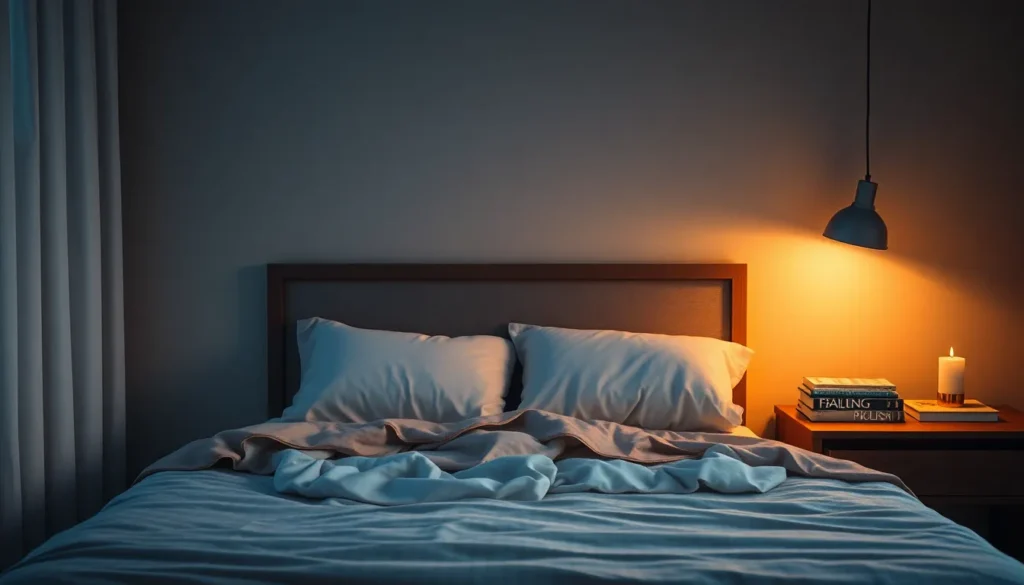In today’s fast-paced world, getting a good night’s sleep often feels like an elusive dream. With stress, technology, and busy schedules, many struggle to achieve the restful slumber their bodies crave. Understanding the importance of sleep is crucial, as it plays a vital role in overall health and well-being.
Encouraging sleep isn’t just about hitting the pillow early; it involves creating an environment and routine that promotes relaxation and comfort. From establishing a bedtime ritual to optimizing the bedroom atmosphere, small changes can lead to significant improvements in sleep quality. This article explores effective strategies to help anyone foster better sleep habits and reclaim those precious hours of rest.
Table of Contents
ToggleUnderstanding Sleep
Understanding sleep is essential for fostering healthy sleep habits. Sleep significantly impacts physical health, mental well-being, and daily functioning.
Importance of Quality Sleep
Quality sleep plays a vital role in various aspects of health. It supports cognitive function, immune response, and emotional stability. According to the Centers for Disease Control and Prevention (CDC), adults typically require 7 or more hours of sleep each night. Insufficient sleep associates with increased risks of chronic conditions such as obesity, diabetes, and heart disease. Prioritizing sleep enhances productivity, improves mood, and fosters overall well-being.
Common Sleep Disorders
Common sleep disorders can disrupt restful sleep and lead to health issues.
- Insomnia: Insomnia involves difficulty falling asleep or staying asleep, affecting approximately 30% of adults.
- Sleep Apnea: Sleep apnea causes interruptions in breathing during sleep; it affects about 25 million adults in the United States.
- Restless Legs Syndrome (RLS): RLS results in uncomfortable sensations in the legs, leading to an urge to move. It affects roughly 5-10% of the population.
- Narcolepsy: Narcolepsy causes excessive daytime sleepiness and sudden sleep attacks; it affects about 1 in 2,000 people.
Recognizing these disorders allows individuals to seek appropriate treatment and improve sleep quality.
Techniques for Encouraging Sleep

Employing effective techniques can significantly enhance sleep quality. Focusing on sleep hygiene practices and relaxation techniques promotes a more restful night.
Sleep Hygiene Practices
Sleep hygiene practices establish a foundation for better sleep. Key practices include:
- Consistent Sleep Schedule: Going to bed and waking up at the same time daily helps regulate the body’s internal clock.
- Comfortable Sleep Environment: Keeping the bedroom dark, quiet, and cool promotes a conducive sleeping atmosphere.
- Limiting Screen Time: Avoiding screens at least 30 minutes before bed reduces blue light exposure, which can disrupt melatonin production.
- Avoiding Caffeine and Nicotine: Steering clear of these stimulants several hours before bedtime prevents interference with falling asleep.
- Establishing a Bedtime Routine: Engaging in calming activities, such as reading or taking a warm bath, signals the body that it’s time to wind down.
Relaxation Techniques
- Deep Breathing Exercises: Practicing deep breathing reduces tension and promotes relaxation, aiding in falling asleep faster.
- Progressive Muscle Relaxation: Tensing and then relaxing muscle groups can alleviate physical stress and prepare the body for sleep.
- Meditation and Mindfulness: Implementing mindfulness practices cultivates awareness and reduces anxiety, enhancing sleep readiness.
- Gentle Yoga or Stretching: Engaging in gentle yoga or stretching relaxes the body and calms the mind.
- Aromatherapy: Using essential oils such as lavender or chamomile may enhance relaxation and create a soothing atmosphere conducive to sleep.
Environmental Factors
Environmental factors significantly influence sleep quality. A comfortable and peaceful atmosphere promotes relaxation and facilitates restful sleep.
Creating a Sleep-Friendly Space
Creating a sleep-friendly space involves several elements that contribute to restful nights.
- Comfortable Bedding: Invest in a quality mattress and pillows that provide adequate support. Consider softness preferences and sleeping positions when selecting these items.
- Room Temperature: Maintain a cool room temperature, ideally between 60°F and 67°F. Adjusting bedding and sleepwear can also help regulate body temperature.
- Decluttered Environment: Keep the bedroom tidy and clutter-free. A clean space reduces distractions and fosters a calming atmosphere.
- Calming Colors: Use soft, neutral colors for walls and decor. These tones create a serene environment conducive to sleep.
The Role of Light and Noise
Light and noise levels impact the ability to fall asleep and stay asleep throughout the night.
- Darkness Optimization: Use blackout curtains or shades to block outside light. Limit light exposure in the hour leading up to sleep by dimming indoor lights.
- Controlled Noise Levels: Minimize disruptive sounds through soundproofing or using white noise machines. Consider earplugs for particularly noisy environments.
- Natural Light Exposure: Aim for exposure to natural light during the day. This practice helps regulate the body’s circadian rhythm, promoting better sleep at night.
Lifestyle Changes
Making lifestyle changes can significantly enhance sleep quality. Focusing on nutrition and exercise provides a strong foundation for a well-rested night.
Nutrition and Sleep
Nutrition plays a crucial role in sleep quality. Specific foods and nutrients can either promote or hinder restful sleep.
- Complex Carbohydrates: Consuming whole grains, fruits, and vegetables facilitates the production of serotonin, a neurotransmitter that encourages relaxation and sleep.
- Magnesium-Rich Foods: Incorporating nuts, seeds, leafy greens, and legumes aids in muscle relaxation and reduces insomnia symptoms.
- Tryptophan Sources: Foods high in tryptophan, such as turkey, dairy products, and bananas, boost melatonin levels, supporting the sleep-wake cycle.
- Caffeine and Alcohol: Limiting caffeine intake in the afternoon and evening prevents disruptions in sleep patterns. Reducing alcohol consumption also contributes to more restorative sleep.
- Hydration Balance: Drinking adequate water throughout the day maintains hydration without leading to frequent nighttime awakenings for bathroom trips.
Exercise and Sleep Quality
Regular exercise improves sleep quality by reducing stress and anxiety levels. Engaging in physical activity provides substantial benefits.
- Aerobic Exercise: Activities like running, cycling, or swimming enhance sleep efficiency by increasing total sleep time and deep sleep stages.
- Timing of Exercise: Exercising earlier in the day promotes better sleep compared to vigorous workouts close to bedtime, as it helps regulate the circadian rhythm.
- Strength Training: Incorporating resistance training contributes to improved sleep patterns and overall health. Sessions of at least 2-3 times a week can be effective.
- Mind-Body Exercises: Practices like yoga or tai chi not only improve flexibility but also foster relaxation, which can lead to better sleep outcomes.
These lifestyle changes, when consistently applied, foster an environment conducive to quality sleep and overall health.
Conclusion
Prioritizing quality sleep is essential for maintaining overall health and well-being. By adopting effective strategies and making small lifestyle changes, individuals can significantly improve their sleep quality. Creating a calming sleep environment and establishing a consistent routine helps set the stage for restful nights.
Recognizing and addressing sleep disorders is equally important, as they can have lasting effects on health. With the right approach to sleep hygiene, relaxation techniques, and mindful lifestyle choices, anyone can foster better sleep habits. Ultimately, investing in sleep is investing in a healthier and more vibrant life.




